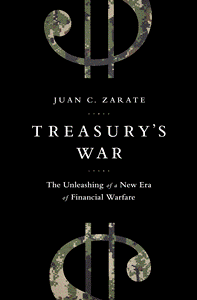
The U.S. economy is the world’s largest and the US dollar the world’s reserve currency. Fundamental to all business, including terrorism and organized crime, is the ability to use the worldwide banking system to originate and receive payments. Most institutions involved in international payments find it necessary, eventually, to do business with financial institutions either located in the United States or American-owned abroad. Using this necessity as fulcrum and lever, the US Treasury Department during the last decade has cajoled (and occasionally coerced) businesses, financial institutions, and governments to cease doing business with terrorists, money launderers, and rogue states. Juan Zarate has written a fascinating first-person account of these actions.
Perhaps the most intriguing part of Zarate’s narrative is his willingness to “name names.” Zarate’s revelations nicely complement the Snowden-based revelations regarding the NSA — and Zarate’s account is first-hand, not stolen. (Would this book have been published, in this form, if he had worked for the CIA?) The often illicit actions of individuals, firms, countries, and banks are revealed. The story of how the Treasury gained access to the SWIFT messaging service (and used the messages to track Al Qaeda financing) is fascinating. He includes first-person descriptions of negotiations with Saudi rulers, and carefully buttresses broad claims such as: “Cutting off flows of funds to Al Qaeda thus meant much more than just targeting a few select individuals or institutions. It was ultimately about challenging a fundamental element of Saudi policy by constricting how the Saudis and their institutions funded activities abroad.” Specific meetings, persons, and events are included, including the effort to close the the large Islamic charity Al Haramain, limit drug financing in Afghanistan, trace the funding of the terrorist attacks in Mumbai, the growth of Lebanon as a center for “bad banks” and money laundering, North Korea’s production of US$100 “supernotes” (Zarate’s discussion is the first that I recall of the alliance between North Korea and US criminal elements to bring such notes to the US), Treasury efforts to bring pressure against Iran’s nuclear program, and others.
The book concludes with a thoughtful discussion of how players in international financial markets are seeking to create banking and payment schemes that never touch American soil or institutions, including efforts by China and the popularity of stateless electronic monies such as bitcoin, and hence are not susceptible to American financial pressures.
My sole complaint concerns repetition: chapters tend to begin and end with missives that seek to persuade the reader of the seriousness of the threats and the cleverness of the Treasury officials fighting them. But that point is well-made at the beginning of the book. My advice to readers is not to be put off by these chapter introductions — move rapidly into the meat of each chapter. Readers interesting in the intersection between the international financial system and international criminal activity will not be disappointed.

